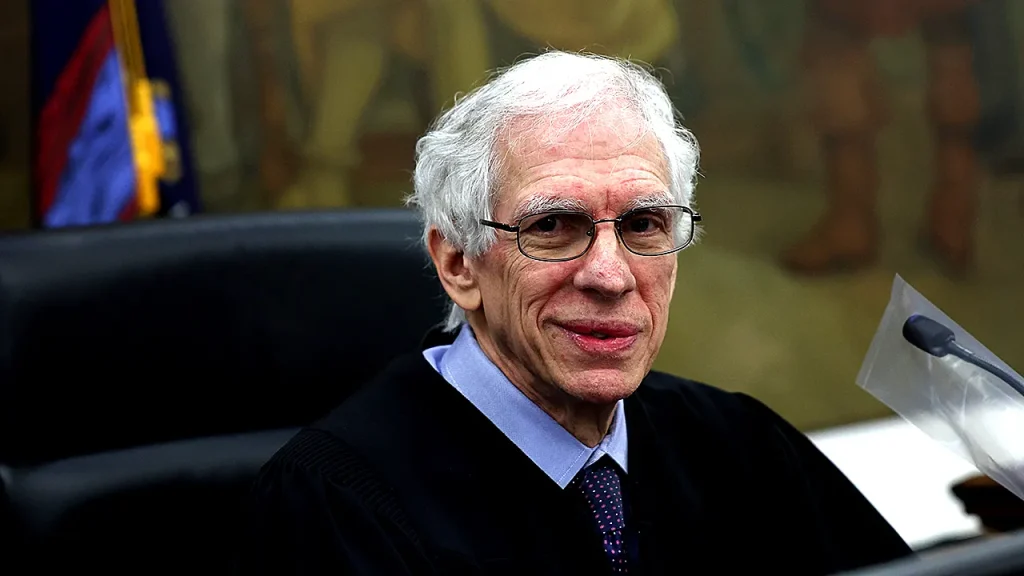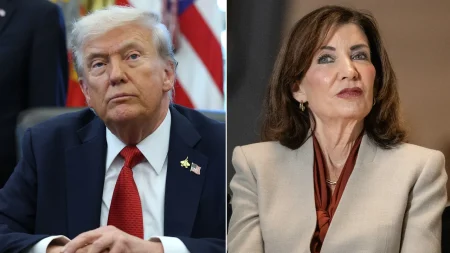Trump’s Legal Win: A Turning Point in New York Civil Fraud Case
In a significant legal victory, President-elect Donald Trump recently saw a New York appellate court erase a $500 million penalty in the high-profile civil fraud case brought by New York Attorney General Letitia James. Following this decision, Trump didn’t hold back his criticism of Judge Arthur Engoron, who presided over the original trial. Taking to Truth Social, Trump called Engoron “incompetent” and “crooked,” claiming the judge refused to acknowledge the appellate court’s decision to remove him. “He’s a highly overturned, CROOKED Judge, who is retiring into a life of lawsuits, along with his Chief Clerk, soon! He is almost as Corrupt as Leticia James, but not quite!” Trump wrote. The case had centered on allegations that Trump inflated his assets’ value to secure more favorable lending terms, with Trump’s allies consistently accusing Engoron of bias against the president-elect, his family, and his business interests.
The New York Appellate Division’s ruling represented a substantial victory for Trump, as the five-member panel determined that the original fine was excessive and violated the Eighth Amendment, which prohibits cruel and unusual punishment. While the court upheld the findings that Trump and his company were liable for fraud and affirmed that James acted within her authority to bring the case, they completely eliminated the $364 million penalty plus interest that had totaled approximately $500 million. This decision preserved the determination of liability but removed the financial punishment that had been imposed on Trump and his organization. The ruling also maintained that injunctive relief against the Trump Organization was appropriate, suggesting some restrictions on the company’s business activities would remain in place despite the elimination of the monetary penalty.
In a notable partial dissent, Justice David Friedman went further than his colleagues, arguing that Attorney General James’ true motivation in pursuing the case was political rather than protecting market integrity. “Her ultimate goal was not market hygiene… but political hygiene, ending with the derailment of President Trump’s political career and the destruction of his real estate business,” Friedman wrote. The justice specifically criticized James’ unprecedented use of Section 63(12) of New York’s Executive Law, which grants the attorney general broad powers to pursue civil fraud cases. Friedman characterized this application as giving James “essentially limitless power to prosecute her political enemies” and concluded that he would have dismissed the complaint entirely. His dissent highlighted that Trump’s business deals involved sophisticated parties who profited from their transactions with no evidence of public harm.
The split among the appellate judges regarding Trump’s liability suggests this case is likely headed for New York’s highest court, the Court of Appeals. James has already indicated she plans to appeal the decision, signaling that this legal battle is far from over. The ongoing dispute carries significant political undertones, as James, a Democrat elected in 2018, has long targeted Trump. During her campaign, she referred to Trump as an “illegitimate president” and promised to “use every area of the law” to investigate him and his businesses. This history has fueled Trump’s allegations that the case against him was politically motivated rather than driven by genuine legal concerns about business practices.
Since Trump’s election victory, the Justice Department has opened investigations related to both the case brought against Trump and allegations that James herself committed mortgage fraud. James has been accused of misrepresenting her primary residence on loans in Virginia and New York, claims she denies while characterizing the probe as a “revenge tour” in retaliation for her civil fraud suit against Trump. This counterinvestigation adds another layer of complexity to an already contentious legal battle, with each side accusing the other of using legal mechanisms for political purposes. James maintains that Trump is using the federal government to target her politically, while Trump’s supporters view the original case as evidence of the weaponization of the legal system against political opponents.
The ongoing legal saga between Trump and New York officials exemplifies the increasingly blurred lines between law and politics in America’s polarized landscape. The appellate court’s decision to uphold Trump’s liability while eliminating the financial penalty represents a nuanced outcome that neither side can claim as a complete victory. As the case potentially moves to New York’s highest court, questions about the proper use of civil fraud statutes, the role of political motivations in prosecutorial decisions, and the appropriate remedies for business misconduct will continue to be debated. Meanwhile, Trump’s return to the presidency adds additional dimensions to this conflict, raising questions about the separation of powers and the potential for federal investigations to influence state-level proceedings. What began as a case about business valuations has evolved into a multifaceted legal and political confrontation that reflects deeper tensions in American governance and jurisprudence.













